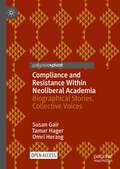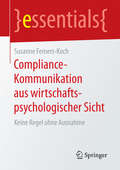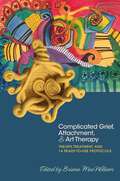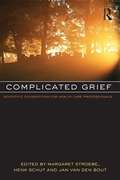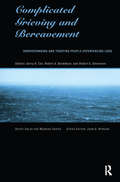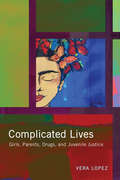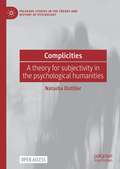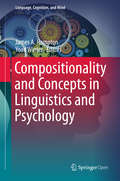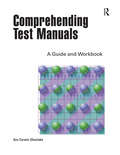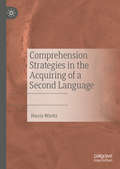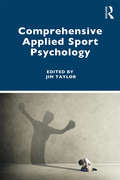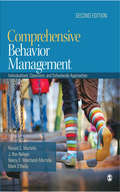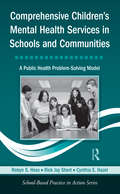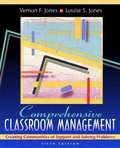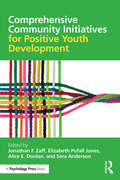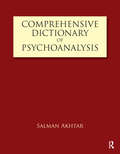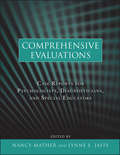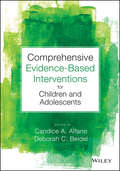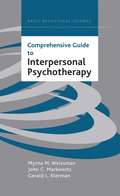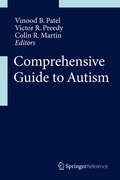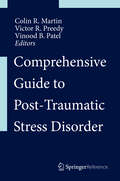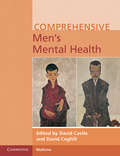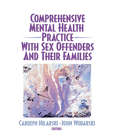- Table View
- List View
Compliance and Resistance Within Neoliberal Academia: Biographical Stories, Collective Voices
by Susan Gair Tamar Hager Omri HerzogThis book reflects on academic life under a neoliberal regime. Through collaborative autoethnographies, the authors share stories about the everyday experiences, dilemmas and conflicts of three academics: the struggle for promotion, teaching’s challenges, the race to publish, confronting bureaucracy and institutional politics, as well as the resulting emotional stress. These stories reveal the impact of neoliberal culture on ideological, economic, social, collegial, and emotional integrity which are integral to academics’ lives today. But along with the challenges, the authors present their vision of hope, and transformation through academic solidarity - and for the silenced voices to be heard, inside academia and beyond it.
Compliance-Kommunikation aus wirtschaftspsychologischer Sicht: Keine Regel ohne Ausnahme (essentials)
by Susanne Femers-KochDieses essential stellt ausgew#65533;hlte psychologische Modelle zu Compliance und Non-Compliance vor, arbeitet Empfehlungen f#65533;r die Compliance-Kommunikation heraus und gibt Beispiele psychologisch versierter Kommunikationsma#65533;nahmen in Unternehmen. Hintergrund daf#65533;r ist die Erfahrung, dass Menschen bestimmte Regeln ignorieren, obwohl sie sie kennen und verstehen. Regelkonformit#65533;t ist psychologisch betrachtet nicht einfach durchzusetzen und psychologische Grundlagen #65533;ber Normkonformit#65533;t k#65533;nnen Compliance-Manager und -Kommunikatoren in ihrer Arbeit unterst#65533;tzen. Auf die Frage ,,Keine Regel ohne Ausnahme?" finden Compliance-Manager hier Antworten aus Sicht der Wirtschaftspsychologie.
Complicated Grief, Attachment, and Art Therapy: Theory, Treatment, and 14 Ready-to-Use Protocols
by Karen Gibbons Anne Briggs Ariel Argueso Briana Macwilliam Dana George Trottier Danielle Klingensmith Dina Schapiro Divya Sunil Gulati Juliana Thrall Julie Day Kateleen Foy Kelsey Dugan Kimberly Bush Laurel Larson Lauren D. Smith Marie Caruso-Teresi Marisa Zarczynski Maya Hormadaly Melissa Meade Romona Mukherjee Sarah Vollmann Sarah Yazdian Susan LeopoldThis wide-ranging book on art therapy and grief provides everything an art therapist needs to feel confident in creating an effective treatment plan. It features fourteen clear-cut protocols, outlining 4-8 week curriculums for working with Complicated Grief, and explains the theory which informs the practice, including popular and evolving models such as Attachment Theory, Mindfulness, Dialectical Behavioral Therapy (DBT) and Art Therapy Relational Neuroscience (ATR-N). Suitable for a variety of settings and clinical populations, the book breaks through the analytical jargon of the field and provides first-person narratives of art therapists exploring their own experiences of grief and client case studies.
Complicated Grief, Attachment, and Art Therapy: Theory, Treatment, and 14 Ready-to-Use Protocols
by Karen Gibbons Anne Briggs Ariel Argueso Dana George Trottier Danielle Klingensmith Dina Schapiro Divya Sunil Gulati Juliana Thrall Julie Day Kateleen Foy Kelsey Dugan Kimberly Bush Laurel Larson Lauren D. Smith Marie Caruso-Teresi Marisa Zarczynski Maya Hormadaly Melissa Meade Romona Mukherjee Sarah Vollmann Sarah Yazdian Susan LeopoldThis wide-ranging book on art therapy and grief provides everything an art therapist needs to feel confident in creating an effective treatment plan. It features fourteen clear-cut protocols, outlining 4-8 week curriculums for working with Complicated Grief, and explains the theory which informs the practice, including popular and evolving models such as Attachment Theory, Mindfulness, Dialectical Behavioral Therapy (DBT) and Art Therapy Relational Neuroscience (ATR-N). Suitable for a variety of settings and clinical populations, the book breaks through the analytical jargon of the field and provides first-person narratives of art therapists exploring their own experiences of grief and client case studies.
Complicated Grief: Scientific Foundations for Health Care Professionals
by Margaret Stroebe Henk Schut Jan van den BoutHow can complicated grief be defined? How does it differ from normal patterns of grief and grieving? Who among the bereaved is particularly at risk? Can clinical intervention reduce complications? Complicated Grief provides a balanced, up-to-date, state-of-the-art account of the scientific foundations surrounding the topic of complicated grief. In this book, Margaret Stroebe,Henk Schut and Jan van den Bout address the basic questions about the concept, manifestations and phenomena associated with complicated grief. They bring together researchers from different disciplines, providing a broad range of cultural and societal perspectives, to enable the reader to access the scientific knowledge base regarding complicated grief, on both theoretical and empirical levels. The book is divided into four main sections: An exploration of the nature of complicated grief Diagnostic categorizations Contemporary research on complicated grief Treament of complicated grief Illuminating the foundations and new innovations in research, Complicated Grief will be essential reading for professionals working with bereavement such as clinical psychologists, health psychologists and psychiatrists, researchers, as well as graduate students of psychology and psychiatry. Margaret Stroebe is Professor at the Department of Clinical and Health Psychology, Utrecht University, and the Department of Clinical Psychology and Experimental Psychopathology, University of Groningen,The Netherlands. Henk Schut is Associate Professor at the Department of Clinical and Health Psychology, Utrecht University, The Netherlands. Jan van den Bout is Professor of Clinical Psychology at Utrecht University, The Netherlands. Contributors: Paul Boelen, Kathrin Boerner, George Bonanno, Laurie Burke, Rachel Cooper, Atle Dyregrov, Kari Dyregrov, Francesca Del Gaudio, Ann-Marie Golden, Jennifer Jacobs, David Kissane, Rolf Kleber, Yeulin Li, Jeffrey Looi, Anthony Mancini, Mario Mikulincer, Michelle Moulds, Robert Neimeyer, Mary-Frances O'Connor, John Ogrodniczuk, William Piper, Holly G. Prigerson, Therese Rando, Beverley Raphael, Paul C. Rosenblatt, Edward Rynearson, Henk A.W. Schut, Phillip Shaver, Margaret S. Stroebe, Jan van den Bout, Marcel van den Hout, Birgit Wagner, Jerome C. Wakefield, Edward Watkins, Talia I. Zaider.
Complicated Grieving and Bereavement: Understanding and Treating People Experiencing Loss (Death, Value and Meaning Series)
by Gerry R. Cox, Robert A Bendiksen and Robert G. StevensonLosses may provide a turning point where an individual faces personal and social choices. Still, one may derive significance through the experience of loss, while another may encounter bereavement with less consequence. "Complicated Grieving and Bereavement: Understanding and Treating People Experiencing Loss" examines complicated grief in special populations, including the mentally ill, POW-MIA survivors, the differentially-abled, suicide survivors, bereaved children, those experiencing death at birth, death in schools, and palliative-care death.
Complicated Lives: Girls, Parents, Drugs, and Juvenile Justice
by Vera LopezComplicated Lives focuses on the lives of sixty-five drug-using girls in the juvenile justice system (living in group homes, a residential treatment center, and a youth correctional facility) who grew up in families characterized by parental drug use, violence, and child maltreatment. Vera Lopez situates girls’ relationships with parents who fail to live up to idealized parenting norms and examines how these relationships change over time, and ultimately contribute to the girls’ future drug use and involvement in the justice system. While Lopez’s subjects express concerns and doubt in their chances for success, Lopez provides an optimistic prescription for reform and improvement of the lives of these young women and presents a number of suggestions ranging from enhanced cultural competency training for all juvenile justice professionals to developing stronger collaborations between youth and adult serving systems and agencies.
Complicities: A theory for subjectivity in the psychological humanities (Palgrave Studies in the Theory and History of Psychology)
by Natasha DistillerThis Open Access book offers a model of the human subject as complicit in the systems that structure human society and the human psyche which draws together clinical research with theory from both psychology and the humanities to advance a more social just theory and practice. Beginning from the premise that we cannot separate ourselves from the systems that precede and formulate us as subjects, the author argues that, in reckoning with this complicity, a model of subjectivity can be created that moves beyond binaries and identity politics. In doing so, the book examines how we might develop a more socially just psychological theory and practice, which is both systems work and intra-psychological work. In bringing together ways of thinking developed in the humanities with clinical psychotherapeutic practice, this book offers one interdisciplinary take on key questions of social and emotional efficacy in action-oriented psychotherapy work.
Compositionality and Concepts in Linguistics and Psychology (Language, Cognition, and Mind #3)
by James A. Hampton Yoad WinterBy highlighting relations between experimental and theoretical work, this volume explores new ways of addressing one of the central challenges in the study of language and cognition. The articles bring together work by leading scholars and younger researchers in psychology, linguistics and philosophy. An introductory chapter lays out the background on concept composition, a problem that is stimulating much new research in cognitive science. Researchers in this interdisciplinary domain aim to explain how meanings of complex expressions are derived from simple lexical concepts and to show how these meanings connect to concept representations. Traditionally, much of the work on concept composition has been carried out within separate disciplines, where cognitive psychologists have concentrated on concept representations, and linguists and philosophers have focused on the meaning and use of logical operators. This volume demonstrates an important change in this situation, where convergence points between these three disciplines in cognitive science are emerging and are leading to new findings and theoretical insights. This book is open access under a CC BY license.
Comprehending Test Manuals: A Guide and Workbook
by Ann C Silverlake• Your students will get valuable practice in interpreting actual excerpts from published test manuals. • Each of the 39 exercises begins with a guideline that helps students review the measurement concepts they will need in order to complete the exercise. • Background notes on each exercise describe the purpose of the test from which the excerpt was drawn. • Students answer questions that require them to locate and interpret important points in the excerpt. • The excerpts are largely unabridged so that students practice interpreting material as it is actually presented by test makers. • The skills they learn with this book can be easily transferred to other test manuals they may be using in the future. • Students have an ethical responsibility to be thoroughly familiar with the technical characteristics of the tests they will use. This book prepares them for this responsibility. • All major topics are covered, including: · validity · reliability · standard error of measurement · norm group composition · derived scores · scales to detect faking · item analysis · cultural bias • The excerpts are drawn from tests such as: · Wechsler Intelligence Scale for Children · Peabody Picture Vocabulary Test · 16PF · Stanford Binet Intelligence Scale · MMPI · Beck Depression Inventory · Stanford Achievement Test Series · KeyMath · and many others!
Comprehension Strategies in the Acquiring of a Second Language
by Harris WinitzThis book provides a critical analysis and account of the development of the Comprehension Approach as a method for language learning. The author draws on interrelated sub-fields - including linguistic theory, child language acquisition, and educational technology - to examine how a comprehension-based strategy could have pedagogical potential for adult second language learning. While second language pedagogy has to date been dominated by production models, this book takes another look at the Comprehension Approach as a possible alternative, presenting results from both child first language and adult second language contexts. It will be of interest to psycholinguistics and applied linguistics scholars, particularly those with an interest in second language teaching and learning.
Comprehensive Applied Sport Psychology
by Jim TaylorThe aim of Comprehensive Applied Sport Psychology (CASP) is to challenge our field to look beyond its current status and propel applied sport psychology and mental training forward and outward with a broad and multi-layered examination of everything psychological, emotionally, and socially that the athletic community contends with in pursuit of athletic success and that sport psychologists and mental trainers do in their professional capacities. Comprehensive Applied Sport Psychology is the first professional book aimed at offering a truly expansive and deep exploration of just about everything that applied sport psychologists, consultants and mental trainers do in their work. CASP plumbs the depths of the athletic mind including attitudes, psychological and emotional obstacles, mental "muscles" and mental "tools," quality of sport training, the health and well-being of athletes, and other areas that are essential to athletic success. This new volume examines not only the many ways that consultants impact athletes, but also explores their work with coaches, teams, parents, and interdisciplinary groups such as sports medicine team and sports management. The book is grounded in both the latest theory and research, thus making it a valuable part of graduate training in applied sport psychology, as well as a practical resource for consultants who work directly with athletes, coaches, teams, and parents. The goal of CASP, in collaboration with dozens of the leading minds in the field, is to create the definitive guide to what applied sport psychology and mental training are and do.
Comprehensive Behavior Management: Individualized, Classroom, and Schoolwide Approaches
by Nancy E. Marchand-Martella Ronald C. Martella J. Ron Nelson Mark O'ReillyComprehensive Behavior Management: Schoolwide, Classroom, and Individualized Approaches supports teachers in preventing management problems and responding to unwanted behavior when it occurs in classrooms. The text offers a comprehensive presentation of three levels of behavior management strategies: individual, classroom, and schoolwide, all three of which contribute to a positive learning environment. A social learning emphasis in which human behavior is viewed within an ecological framework is integrated throughout the text. Application of this information is supported by a range of pedagogical devices such as vignettes, examples, strategies, and activities to show teachers how to manage behavior effectively. The analysis and applications in this text cover both general education and special education strategies.
Comprehensive Care for Complex Patients: The Medical-psychiatric Coordinating Physician Model
by Steven A. Frankel Philip Erdberg James A. Bourgeois'Complex patients' are a sizeable population who generally require disproportionate attention for their management and respond poorly to treatment. Their systemic medical, psychiatric and personal needs have a tendency to drain or exceed the capabilities of those who treat them whilst overutilizing health care resources. As this patient population grows, we move ever closer to a crisis in health care delivery. This volume presents an innovative team-based approach for assessing and managing diagnostically complex and management intensive patients. The physician-led 'Medical-Psychiatric Coordinating Physician (MPCP)' model not only improves patient treatment, but also provides for the containment of costs by reducing redundancy and curbing excess in the use of services. Other benefits include improved diagnostic accuracy and decision making, as well as better communication among physicians and allied health professionals. This book is essential reading for psychiatrists, primary care physicians, and physicians, directors and administrators working in multidisciplinary specialty clinics.
Comprehensive Children's Mental Health Services in Schools and Communities: A Public Health Problem-Solving Model (School-Based Practice in Action)
by Robyn S. Hess Rick Jay Short Cynthia E. HazelDespite the growing emphasis on a population-based training and service delivery model for school psychology, few resources exist to provide guidance concerning how such services might be conceptualized and put into place. In this book, the authors propose a public health model for comprehensive children’s mental health services that expands, rather than replaces, the traditional model of school psychology. The background and theoretical perspective for this public health model are discussed as an important way to solve problems and accomplish goals in schools, after which the authors outline and develop a clear, practical procedure for implementing and evaluating programs based on public health ideas. A case study in one elementary school walks readers through the stages of applying a public health model, detailing the key steps of each stage. Finally, the authors consider the changes to the role of school psychologist that will be required to practice a public health problem-solving model. An accompanying CD contains sample forms, handouts, and other valuable materials that will be of use to school psychologists implementing this public health model in their schools.
Comprehensive Classroom Management: Creating Communities of Support and Solving Problems
by Vernon Jones Louise JonesThis text for educators, administrators, and counselors investigates such influences on student behavior as interpersonal relationships in the class, the interaction between the school and the home, student motivation, and methods of instruction.
Comprehensive Community Initiatives for Positive Youth Development: Closing Disparities
by Jonathan F. Zaff Elizabeth Pufall Jones Alice E. Donlan Sara AndersonWhile Comprehensive Community Initiatives (CCIs) provide promising avenues to support the positive development of all young people, research findings assessing the relation between CCIs and community-level child and youth outcomes have been mixed. Although there are exceptions, few evaluations on the impact of CCIs on positive youth development have been conducted. In this edited collection, the authors draw on the field of developmental science to provide a basis for why CCIs are a powerful tool for providing all young people with opportunities to thrive. The collection begins with a brief history of CCIs and their impacts to illustrate why a developmental framework is needed, followed by a discussion of the editors’ proposed framework. Each chapter that follows offers some of the most rigorous research and extant knowledge of CCIs. In the final chapter, the editors provide recommendations for future research that can systematically explore the impact of CCIs, better indicating their effectiveness and offering proven strategies that can be implemented in varying contexts. Altogether, this collection offers researchers and practitioners in the field a means by which to better incorporate theory into the vision and practices of CCIs and, as such, the tools to better measure the outcomes of the CCIs.
Comprehensive Dictionary of Psychoanalysis
by Salman AkhtarThis book provides easy to read, concise, and clinically useful explanations of over 1800 terms and concepts from the field of psychoanalysis. A history of each term is included in its definition and so is the name of its originator. The attempt is made to demonstrate how the meanings of the term under consideration might have changed, with new connotations accruing with the passage of time and with growth of knowledge. Where indicated and possible, the glossary includes diverse perspectives on a given idea and highlights how different analysts have used the same term for different purposes and with different theoretical aims in mind.
Comprehensive Evaluations
by Nancy Mather Lynne E. JaffeAn invaluable collection of sample case reports from experts in child and adolescent assessmentWith contributions from authorities in the fields of psychology and special education-including Dawn Flanagan, Elaine Fletcher-Janzen, Randy Kamphaus, Nadeen Kaufman, George McCloskey, Jack Naglieri, Cecil Reynolds, and Gale Roid--Comprehensive Evaluations provides over fifty sample case reports to help you draft carefully planned, goal-directed, and comprehensive evaluations that clearly explain the reasons for a student's school-related difficulties, from preschool to postsecondary level.A wellspring of information for educational professionals, Comprehensive Evaluations provides models for writing diagnostic reports to accompany the tests most frequently administered in the evaluation of children, adolescents, and adults, including the BASC-2, KABC-II, WAIS-IV, WISC-IV, and WJ III. The reports reflect various disciplines within psychology and education, different theoretical perspectives and paradigms, and span a broad spectrum of disabilities.The diagnostic reports found within Comprehensive Evaluations will help:Expand your familiarity with widely used test instrumentsEnhance your understanding of the interpretation of test scoresImprove your ability to tailor written reports to the purposes of the evaluationTranslate assessment results into meaningful treatment recommendationsRecognize the differences in what evaluators from various school districts, agencies, and private practices consider to be a comprehensive evaluationAppreciate how your theoretical perspective and choice of tests can influence diagnostic conclusionsDetermine a report writing style that meets your needsComprehensive Evaluations deftly illustrates how thorough assessments help empirically pinpoint the reasons a student is struggling in school, which then allows an evaluator to select the most appropriate accommodations and interventions to help the student succeed.
Comprehensive Evidence Based Interventions for Children and Adolescents
by Deborah C. Beidel Candice A. AlfanoA complete guide to evidence based interventions for childrenand adolescents The past decade has witnessed the development of numerousinterventions proved to be highly effective; several treatments arenow considered to be "well established" or "probably efficacious"interventions for children. Given the range of providers workingwith children--clinical psychologists, child psychiatrists,clinical social workers, school psychologists, and marriage andfamily therapists--this book is designed to provide allprofessionals the information they now need about the use of theseevidence-based interventions (EBIs), as well as the evaluationcriteria used to determine their efficacy in in meeting the mentalhealth needs of children.Alfano and Beidel have assembled a team of experts to write thedisorder chapters. Each chapter begins with an overview of thedisorder then delves into evidence-based approaches to treatment,the impact of parental involvement, case-by-case modifications,progress measurement, and clinical examples. In overview chaptersthe editors cover:The role of development in treatment planning andimplementationDissemination of EBIs into school and community settingsThe use of controversial therapies with childrenEmerging methods of service delivery and accessimprovementComprehensive Evidence Based Interventions for Children andAdolescents provides clinicians, researchers, and studentsalike with the theoretical, conceptual, and practical skills toprovide children and adolescents with the best care possible.
Comprehensive Guide To Interpersonal Psychotherapy
by Gerald Klerman Myrna M. Weissman John C. MarkowitzSince its introduction as a brief, empirically validated treatment for depression, Interpersonal Psychotherapy has broadened its scope and repertoire to include disorders of behavior and personality as well as disorders of mood. Practitioners in today's managed care climate will welcome this encyclopedic reference consolidating the 1984 manual (revised) with new applications and research results plus studies in process and in promise and an international resource exchange.
Comprehensive Guide to Autism
by Victor R. Preedy Colin R. Martin Vinood B. PatelAutism is a complex multifaceted disorder affecting neurodevelopment during the early years of life and, for many, throughout the life span. Inherent features include difficulties or deficits in communication, social interaction, cognition, and interpersonal behavioral coordination, to name just a few. Autism profoundly impacts the affected individual, the family, and, in many cases, the localized communities. The increased prevalence of childhood autism has resulted in rapid developments in a wide range of disciplines in recent years. Nevertheless, despite intensive research, the cause(s) remain unresolved and no single treatment strategy is employed. To address these issues, "Comprehensive Guide to Autism" is an all-embracing reference that offers analyses and discussions of contemporary issues in the field of autism. The work brings together scientific material from leading experts in the field relating to a wide range of important current topics, such as the early identification and treatment of children with autism, pertinent social and behavioral studies, recent developments in genetics and immunology, the influence of diet, models of autism, and future treatment prospects. "Comprehensive Guide to Autism" contains essential readings for behavioral science researchers, psychologists, physicians, social workers, parents, and caregivers. "
Comprehensive Guide to Post-Traumatic Stress Disorders
by Victor R. Preedy Colin R. Martin Vinood B. PatelThis is an all-embracing reference that offers analyses and discussions of contemporary issues in the field of PTSD. The book brings together scientific material from leading experts in the field relating to a wide range of important current topics across disciplines. These include the early identification of PTSD and subsequent treatment, to social and behavioral studies, to biochemical, molecular and genetic research. With more than 125 chapters organized in 12 major sections, this is the most complete single resource on PTSD.
Comprehensive Men's Mental Health
by David Castle David CoghillAlthough research shows that there is a silent crisis in men's mental health, there remains surprisingly little literature on the subject. This important textbook provides up-to-date, practical and evidence-based information on how mental health issues affect men and the way treatments should be offered to them. Key opinion leaders from across the globe have been brought together to offer much-needed understanding about the socio-politico-economic context of men's lives today as well as ethnic and cultural effects and genetic, epigenetic and gene-environment interaction. Clinically focused chapters cover topics such as suicide and self-harm, violence, sociopathy and substance misuse in men; depression, anxiety and related disorders; and psychotic and cognitive disorders. The book uses a lifespan approach to assessment and treatment, accounting for age and developmental phase. An invaluable source of information for clinical specialists and trainees in psychiatry, psychology, and mental health nursing as well as social workers, and occupational therapists.
Comprehensive Mental Health Practice with Sex Offenders and Their Families
by M. Carolyn Hilarski John S WodarskiA comprehensive look at the many types of male and female sex offenders who victimize children, adolescents, and adultsComprehensive Mental Health Practice with Sex Offenders and Their Families presents practitioners, professionals, and policymakers with effective, user-friendly practice methods for working with all types of sex offenders. Each chapter provides an overview of a specific category of sex offender and presents case examples and sample treatment plans with short- and long-term goals and objectives. This unique book also includes the latest assessment and intervention methods, family and relapse prevention efforts, and cultural issues that affect service delivery.Comprehensive Mental Health Practice with Sex Offenders and Their Families examines the etiology, prevalence, and behavioral consequences of eight different sex offender typologies to provide you with a much broader focus than you&’ll find in other sex offender books currently on the market. The book explores gender issues, demographics, offense characteristics, family characteristics, and assessment issues in dealing with both male and female sex offenders who use psychological and physical means to victimize children, adolescents, and adults. The end result is effective as a reference for health and mental health practitioners, as a resource for program implementation and outcome evaluation for policymakers and researchers, and as a classroom aid for the next generation of social workers and health and mental health providers.Comprehensive Mental Health Practice with Sex Offenders and Their Families examines: child sex offenders-inappropriate, developmentally precocious, and aggressive sexual behavior among children adolescent sex offenders-criminal sexual acts committed by juveniles adult male sex offenders-the average male sexual molester will victimize hundreds of children in his lifetime women who sexually abuse children-challenging the stereotypes about motherhood and female-child relationships professional perpetrators-clerics, teachers, tutors, athletic coaches intellectually and developmentally challenged sex offenders-sexually abusive acts committed by people with intellectual disabilities (ID) violent sex offenders-physical and psychological injuries suffered during sexual violation comorbid psychopathology in child, adolescent, and adult sexual offenders-anti-social, narcissistic, and sadistic behaviors, learning problems, neuropsychological impairments, and moreComprehensive Mental Health Practice with Sex Offenders and Their Families is an essential resource for anyone working with diverse groups of sex offenders.
